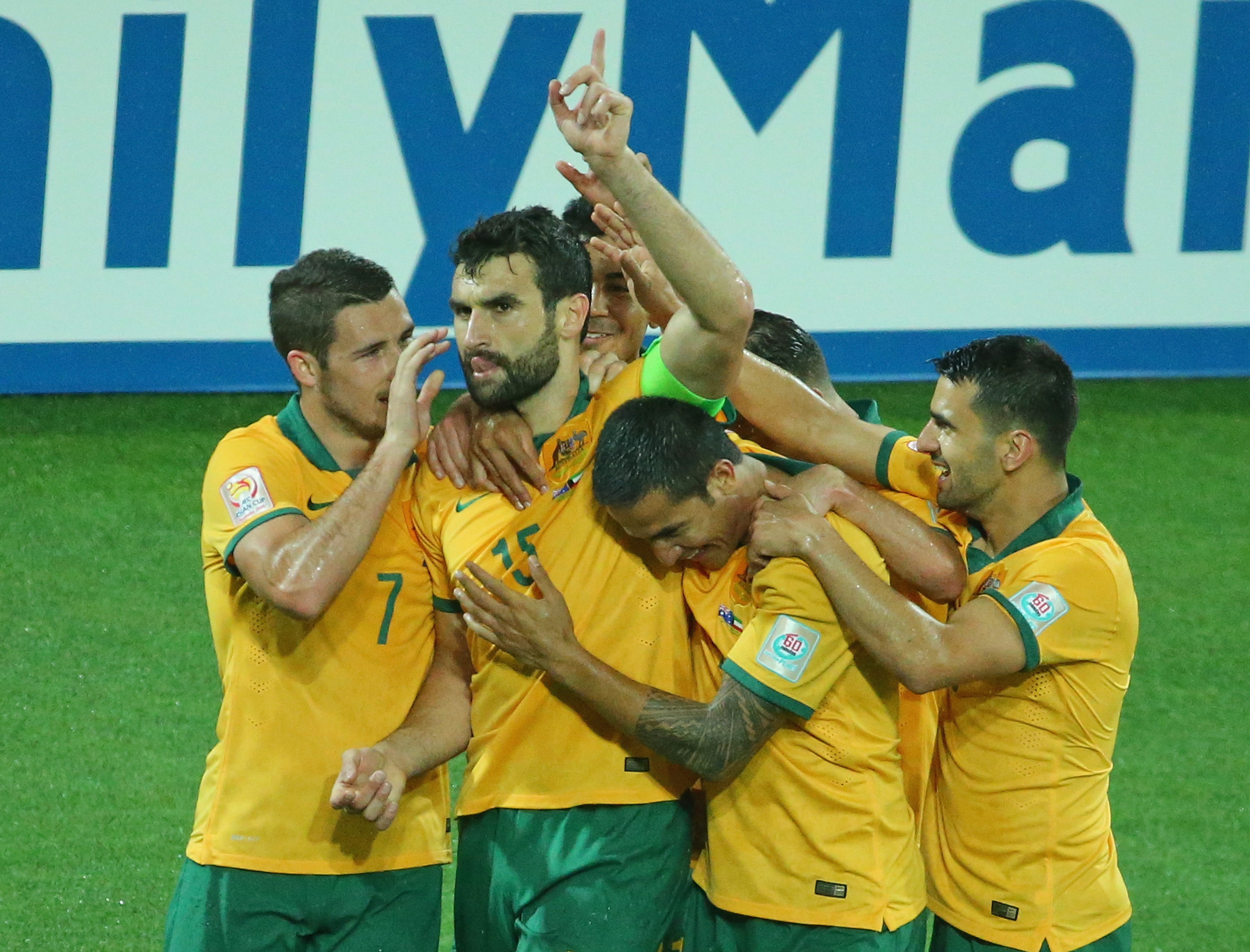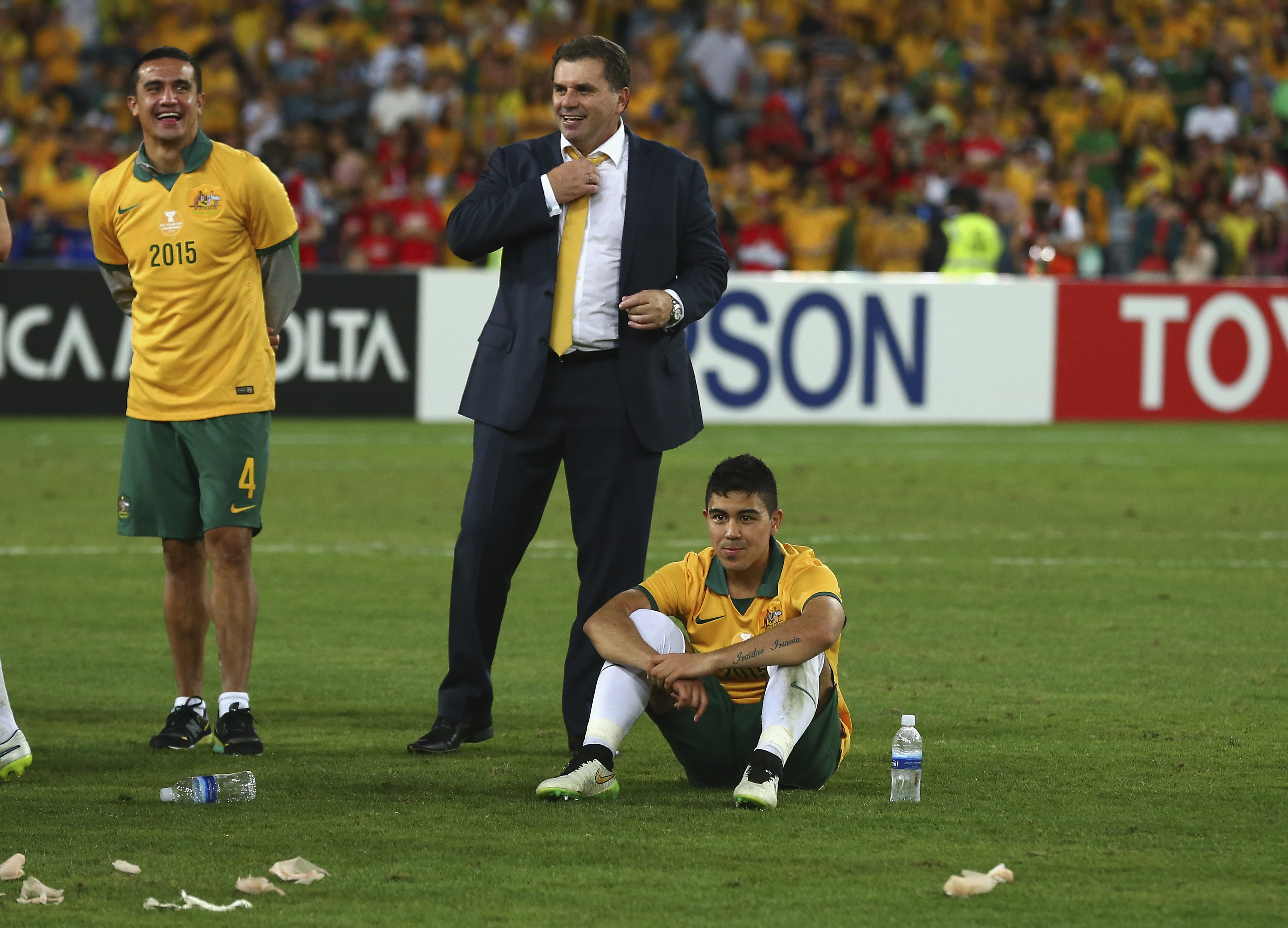The Socceroos generally begin tournaments in hope rather than expectation.
But for Australia, the 2015 AFC Asian Cup was the exception, a competition where one of Asian football's heavyweights believed it had been given the perfect platform to announce itself as the region's kingpin.
What better stage to do so than by winning the tournament in your own backyard, in front of your own fans, and, in the process, boosting the domestic game and Australia's standing in the global football firmament.
Ange Postecoglou, the then Socceroos coach, had been planning and scheming for this month-long tournament ever since he had taken the job in late 2013, after Holger Osieck's tenure had ended with two heavy defeats to Brazil and France in friendlies that turned out to be anything but hospitable.
Osieck had qualified the Socceroos for the 2014 FIFA World Cup - Josh Kennedy's late header in a final group stage game against Iraq in Sydney had meant they did not need the lottery of the continental play-offs.
But, the general view was that Australia 2015 and the Asian Cup, not Brazil 2014 and the World Cup, would be the defining event of Postecoglou's tenure.
In fact, the coach had been accused in some quarters of using the World Cup some six months earlier as a warm-up competition, a series of tough games (against Chile, The Netherlands and then world champions Spain) in which he could gauge the mettle of his squad, see who could handle the pressure that would come with hosting Asia's biggest tournament and, crucially, work on his patterns of play and best starting eleven for the job that was to come.
With former skipper Lucas Neill no longer part of the setup and Mile Jedinak, the tall, stoic, heavily bearded midfielder anointed as his successor, Postecoglou and his lieutenants, Aurelio Vidmar and Ante Milicic, had chosen their on-field leader. With the experience of Socceroos goalscoring legend Tim Cahill and midfield creator Mark Bresciano alongside, there was no lack of know-how and leadership.
All was set for for a resounding triumph in the opening game, at the Melbourne Rectangular Stadium (aka AAMI Park) against Asian minnows Kuwait. Or was it?
Much to the shock of the big crowd, it was the unconsidered Kuwaitis who took the lead through an eighth-minute Hussain Faddah goal.
That, however, proved to be a temporary aberration. Goals from Tim Cahill and then little-known young midfielder Massimo Luongo had put Australia in front at the interval before a Mile Jedinak penalty put them in the second-half driving seat.
James Troisi's stoppage time goal to make it 4-1 merely emphasised Australia's overall superiority.

Their main rival in Group A, South Korea, had got off to a much less impressive start, defeating a competitive Oman side 1-0 in Canberra.
The Taeguk Warriors, as they are known, also struggled to put away Kuwait in their game four days later while Australia blitzed Oman 4-0, with goals from Robbie Kruse, Matt McKay and a Mark Milligan penalty before half-time wrapping the points up. Tomi Juric added the cherry to the cake with a 70th-minute strike.
So when the two big guns met a few days later in Brisbane it was the Socceroos who were on a roll, having scored four goals in both their games, against a Korean side that kept things tight at the back but had trouble converting their chances.
The mood was positive in the 48,000-plus crowd with Australia shirts and flags providing a yellow backdrop in the stands as roars of approval greeted the hosts whenever they attacked.
But South Korea had not read the script and won their third match in a row 1-0, courtesy of Lee Jung-hyup's 33rd-minute goal.
Try as they might, Australia could not find a leveller, so immediately the seedings, and with it, the perceived home ground advantage of the host nation, was lost for the knockout stages.
Instead of heading south to Melbourne, where they had initially been based and had enjoyed so much success in their opening game against Kuwait, to face the so-called ''White Wolves'' of Uzbekistan in a quarter-final, they had to play in the more stamina-sapping conditions of Brisbane against the group B winners China.
The Chinese have underperformed throughout most of their football history, but they began this tournament in great style and had won all three of their group matches. They defeated the always-strong Saudi Arabia 1-0 in their opening game and then followed up with a come-from-behind win over the Uzbeks and a dismissal of North Korea, both by the same 2-1 scoreline.
Brisbane would hold no fears, either logistically or climactically for them, as they had played two of their three group games there and had positive memories of the stadium - unlike Australia, for whom the loss to South Korea was fresh in the mind.
Still, Ange Postecoglou's men could count on the support of a strong home crowd - although plenty of Chinese expats ensured they would have strong backing too - and the desire to atone for the South Korean loss was extra motivation.
Mile Jedinak had missed the previous two group matches but returned to bolster Postecoglou's midfield and helped Australia to dominate posession.
The Socceroos created numerous chances but failed to capitalise on their superiority, and some loose balls gave their supporters palpitations as they presented China with some unlikely opportunities.
But cometh the hour, cometh the man - in the shape of star striker Tim Cahill.
The Socceroos talisman had earned legendary status with his exploits over the previous decade, and he burnished his reputation even more in the second half with two goals - the first a dramatic overhead kick to put Australia in the lead three minutes into the second half, the second to seal the game with 25 minutes remaining.
Cahill's opener will live long in the memory of those who saw it not just for the surprising athleticism he showed for a 35-year-old, but for the timing, just when his country needed him most. With Cahill, perhaps the greatest Socceroo (if not the best player) of all it was ever thus.
The other quarter-finals proved a mixed bag. South Korea, with Son Heung-min netting a double, routinely dispatched the Uzbeks, but there was high drama in the Iran v Iraq and Japan v the UAE encounters.
The two Middle Eastern nations, who had fought an eight-year-long war against each other in the 1980s, played out a spectacular 3-3 draw in Canberra with four goals coming in extra time after scores were locked at 1-1 in 90 minutes, Iraq twice taking the lead only to be pegged back on both occasions. In a tense penalty shootout, it was Iraq who progressed 7-6 to set up a semi-final with the South Koreans.
Japan, along with Australia, were the pre-tournament favourites and were expected to go through to set up an earlier than anticipated meeting with Australia in the semi-finals, both having been predicted to meet in the final, not the penultimate round.
The UAE however had other ideas and Japan didn't even make it to the last four and that showdown with the Socceroos.
After taking an early lead, the UAE held the Japanese at bay until the 81st minute, when Gaku Shibasaki equalised.
It seemed as though the Samurai Blue would have enough know-how to overrun their rivals in extra-time. But it was the UAE who held firm and had the steadier nerves in the shootout to go through 5-4 after no less a star than Keisuke Honda (later to play in the A-League for Melbourne Victory) had missed his spot-kick.
This was a competition that had already produced plenty of unexpected twists and turns, with the Socceroos' so-called ''failure'' to top their group sending them on a round-the-country tour of venues. No one had expected two outsiders like Iraq - the 2007 champions - and the UAE to be just one game away from the decider.
But there were no shocks or fireworks in what turned out to be regulation victories in the semi-finals for the two big guns.
South Korea had put their Australia Day semi against Iraq to bed by the 50th minute when Kim Young Gwon's goal added to Lee Jeong Hyeop's 20th-minute opener, allowing the Koreans to manage the remaining time out for a 2-0 win.
Australia's cross-country jaunt now continued in Newcastle (their fourth different venue in 18 days) when they faced a UAE side with their tails up following that surprise defeat of Japan.
But those exertions seemed to deflate the Middle Eastern side as Australia played with power, pace and a sense of urgency that they had not always managed to display for entire games.
In truth, this semi-final was even more predictable than the other as the Socceroos got off to a perfect start when Trent Sainsbury headed home to give them a third-minute lead. A second goal arrived just 11 minutes later from the unlikely source of full-back Jason Davidson, and that was pretty much that.
A two-goal lead had been problematic for Australia in the past: who can ever forget that awful night at the MCG in November 1997 when World Cup qualification was squandered with the national team holding a 2-0 lead against Iran with barely a quarter of an hour to go only for the visitors to level up at 2-2 and qualify for France '98 on the away goals rule?
But this time the Socceroos were determined not to make any similar mistakes as they held on to set up a clash with their group phase conquerors South Korea in the final.
The rest, as they say, is history.
The images of the delighted players celebrating and Postecoglou, yellow tie undone and jacket flapping as he saluted the Stadium Australia crowd, are now part of Australian soccer mythology as the nation raucously hailed the team and the coach who gave it what is still Australia's only major trophy in the men's game.

Not that the win was plain sailing. As befits a final between two powerful nations, it was tight, edgy and nervous with South Korea having the better of the first period until Massimo Luongo unleashed a spectacular drive to put the Socceroos 1-0 up just before the half-time break. It was the first goal that Korea had conceded in the entire tournament.
Victory looked to be wrapped up as the clock ticked down into stoppage time at the end of 90 minutes before Son - the Tottenham star with whom Postecoglou was to forge an entirely different relationship nearly a decade later - popped up to equalise with just moments remaining.
Having had one hand on the trophy it would have been easy for Australia to crumble in extra-time, but that is not the Socceroos way, nor that of their coach.
Postecoglou and Jedinak rallied their men and it was substitute James Troisi who stepped off the bench and into Australian soccer folklore when he capitalised on some excellent work by another substitute, Tomi Juric, to blast home from close range.
It was a night that none who were in the packed venue will ever forget, least of all Postecoglou and his players. It remains the standard by which future teams will continue to be judged.
*MICHAEL LYNCH a former chief soccer writer for the Melbourne Age, covered the 2015 Asian Cup for both The Age and the Sydney Morning Herald.
